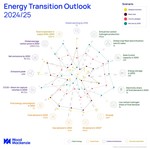News Release from Wood Mackenzie Ltd
Wind Industry Profile of
How the energy transition can reduce the risk of future shocks
The crisis caused by Russia’s invasion of Ukraine has highlighted the challenges for energy supplies as the world moves to tackle the threat of climate change. The uptake of low-carbon technologies can help address problems of energy security and affordability, and strengthen resilience to shocks in the future. But businesses, investors and governments need to manage the transition in the right ways, according to the latest analysis from Wood Mackenzie, a Verisk business (Nasdaq:VRSK).
Ed Crooks, Vice-Chair, Americas at Wood Mackenzie, said: “Soaring fossil fuel prices are a threat not only to consumers and the economies of energy-importing countries, but also to the energy transition itself. If governments want to continue to make progress on cutting emissions, they will need to show that they can deliver energy security and affordability at the same time through timely investments and clear policies.”
The five key lessons drawn by Wood Mackenzie analysts are:
- The world is still reliant on fossil fuels, and the energy transition needs to be focused on cutting demand first, rather than supply.
The Covid-19 pandemic and the war in Ukraine have highlighted the central importance of fossil fuels to the global economy and how finely balanced these markets are, with fossil fuels still accounting for roughly 80% of primary energy worldwide.
If policy and investment decisions constrain oil and gas supplies, such as discouraging investment in upstream assets or new pipelines, while demand remains robust, that volatility will threaten consumers with periods of high prices.
Ann-Louise Hittle, Vice President of Oils Research at Wood Mackenzie, said: “To avoid worsening the risk of future oil price spikes, the emphasis needs to be on reducing demand, with supply following as higher-cost, higher-emissions sources are no longer needed. Curtailing supply while demand remains strong is a recipe for crisis.”
2. Resilience and security can be expensive, but the costs are worth paying as insurance against price volatility
“Electrification is central to cutting emissions and reducing vulnerability to commodity price shocks, but to do this, electricity systems must deliver power reliably and with low emissions, which can be expensive” Crooks said.
Solar and wind power have made significant inroads, but fossil fuels still dominate power supplies in most markets, accounting for about 60% of electricity generation worldwide in 2021.
“The EU and the UK have in total developed an impressive 428 gigawatts of wind and solar capacity this century, but over the same period, their reliance on imports has increased from 44% to 60% of their primary energy,” Crooks added.
There are other options for managing variability, including demand response and energy storage, but each have limitations and further technological innovation is needed. Although the costs of wind and solar generation have fallen rapidly and are likely to decline further in the long term, the cost of maintaining a stable grid is rising.
Crooks said: “In the long term, declining costs for low-carbon energy should ease the burden on consumers, but that will take time. Until then, one way to help consumers struggling with energy costs is to use tax and spending policy. Cuts in taxes on energy may be politically unavoidable at times, but they obscure the price signals encouraging people to reduce consumption. A better solution would be to use flat-rate rebates to help relieve hardship.”
3. Innovation in new technologies is crucial for energy security, as well as for tackling climate change.
Prakash Sharma, Vice President of Multi-Commodity Research at Wood Mackenzie, said: “The only way to achieve a largely electrified energy system based on zero-carbon generation will be through advances in technology. We have seen some promising progress in recent years, but the technologies in the design, prototype or demonstration phases need to receive regular government funding to establish commercial viability.
“They also need regulatory and legal frameworks that encourage development, so the private sector can invest, scale up and deploy,” Sharma added.
Energy efficiency can also be an important way to curb demand and reduce vulnerability to price shocks, but only if there is a comprehensive policy to unlock it.
“Policy support is crucial for innovation. If it is left to the private sector, it will not make progress fast enough to address the challenges of climate and energy security on the urgent schedule that is required,” Sharma continued.
4. Linkages between energy markets have become stronger. Shocks in one sector or region can be rapidly transmitted to another, increasing the need for resilience.
The globalisation of gas has only really emerged in the past 10 years, as LNG increased its share of global trade from 35% in 2010 to 50% in 2021. And as the global gas market becomes more integrated, customers and policymakers need to do more to provide flexibility in both supply and demand, to cushion the impact of shocks between sectors and regions. This could include broadening their sources of supply, sometimes under long-term contracts, increasing the availability of storage and import infrastructure, and creating flexibility in the power market through demand response programmes.
5. Globalisation creates geopolitical risks for energy security. Consuming countries need to manage those risks through stronger domestic production and greater investments overseas, or both.
The pandemic and the war in Ukraine have triggered a general reassessment of the vulnerabilities of international supply chains, as well as the reconfiguration of energy trade flows around the world, a process that Wood Mackenzie analysts describe as ‘re-globalisation’ rather than ‘de-globalisation’.
“Today’s energy crisis has put a spotlight on other potential threats to energy security ? from low-carbon technologies as well as fossil fuels and from countries other than Russia, highlighting the need to support diversity of supply in key sectors, from the electric vehicle and battery supply chain to the mining of critical minerals,” Crooks said.
- Source:
- Wood Mackenzie
- Author:
- Press Office
- Link:
- www.woodmac.com/...
- Keywords:
- Wood Mackenzie, energy crisis, Russia, Ukraine, invasion, security, resilience, low carbon, renewable energy, fossil fuels, raw materials, supply
























